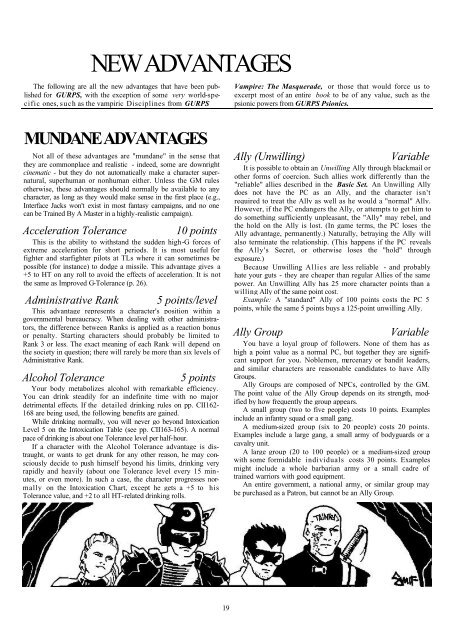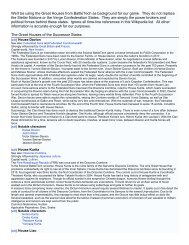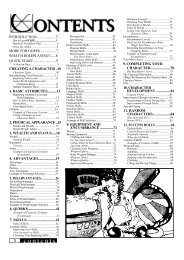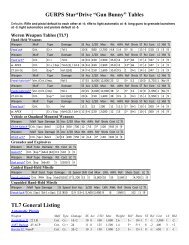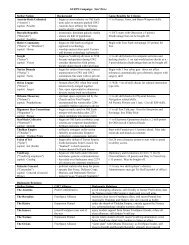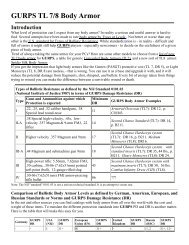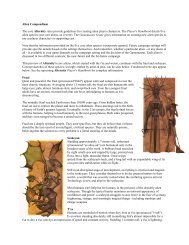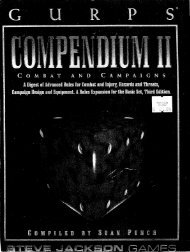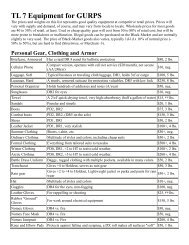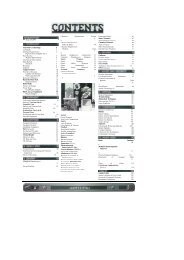GURPS - Compendium 1..
GURPS - Compendium 1..
GURPS - Compendium 1..
You also want an ePaper? Increase the reach of your titles
YUMPU automatically turns print PDFs into web optimized ePapers that Google loves.
NEW ADVANTAGES<br />
The following are all the new advantages that have been published<br />
for <strong>GURPS</strong>, with the exception of some very world-specific<br />
ones, such as the vampiric Disciplines from <strong>GURPS</strong><br />
Vampire: The Masquerade, or those that would force us to<br />
excerpt most of an entire book to be of any value, such as the<br />
psionic powers from <strong>GURPS</strong> Psionics.<br />
MUNDANE ADVANTAGES<br />
Not all of these advantages are "mundane" in the sense that<br />
they are commonplace and realistic - indeed, some are downright<br />
cinematic - but they do not automatically make a character supernatural,<br />
superhuman or nonhuman either. Unless the GM rules<br />
otherwise, these advantages should normally be available to any<br />
character, as long as they would make sense in the first place (e.g.,<br />
Interface Jacks won't exist in most fantasy campaigns, and no one<br />
can be Trained By A Master in a highly-realistic campaign).<br />
Acceleration Tolerance<br />
10 points<br />
This is the ability to withstand the sudden high-G forces of<br />
extreme acceleration for short periods. It is most useful for<br />
fighter and starfighter pilots at TLs where it can sometimes be<br />
possible (for instance) to dodge a missile. This advantage gives a<br />
+5 to HT on any roll to avoid the effects of acceleration. It is not<br />
the same as Improved G-Tolerance (p. 26).<br />
Administrative Rank<br />
5 points/level<br />
This advantage represents a character's position within a<br />
governmental bureaucracy. When dealing with other administrators,<br />
the difference between Ranks is applied as a reaction bonus<br />
or penalty. Starting characters should probably be limited to<br />
Rank 3 or less. The exact meaning of each Rank will depend on<br />
the society in question; there will rarely be more than six levels of<br />
Administrative Rank.<br />
Alcohol Tolerance<br />
5 points<br />
Your body metabolizes alcohol with remarkable efficiency.<br />
You can drink steadily for an indefinite time with no major<br />
detrimental effects. If the detailed drinking rules on pp. CII162-<br />
168 are being used, the following benefits are gained.<br />
While drinking normally, you will never go beyond Intoxication<br />
Level 5 on the Intoxication Table (see pp. CII163-165). A normal<br />
pace of drinking is about one Tolerance level per half-hour.<br />
If a character with the Alcohol Tolerance advantage is distraught,<br />
or wants to get drunk for any other reason, he may consciously<br />
decide to push himself beyond his limits, drinking very<br />
rapidly and heavily (about one Tolerance level every 15 minutes,<br />
or even more). In such a case, the character progresses normally<br />
on the Intoxication Chart, except he gets a +5 to his<br />
Tolerance value, and +2 to all HT-related drinking rolls.<br />
Ally (Unwilling)<br />
Variable<br />
It is possible to obtain an Unwilling Ally through blackmail or<br />
other forms of coercion. Such allies work differently than the<br />
"reliable" allies described in the Basic Set. An Unwilling Ally<br />
does not have the PC as an Ally, and the character isn't<br />
required to treat the Ally as well as he would a "normal" Ally.<br />
However, if the PC endangers the Ally, or attempts to get him to<br />
do something sufficiently unpleasant, the "Ally" may rebel, and<br />
the hold on the Ally is lost. (In game terms, the PC loses the<br />
Ally advantage, permanently.) Naturally, betraying the Ally will<br />
also terminate the relationship. (This happens if the PC reveals<br />
the Ally's Secret, or otherwise loses the "hold" through<br />
exposure.)<br />
Because Unwilling Allies are less reliable - and probably<br />
hate your guts - they are cheaper than regular Allies of the same<br />
power. An Unwilling Ally has 25 more character points than a<br />
willing Ally of the same point cost.<br />
Example: A "standard" Ally of 100 points costs the PC 5<br />
points, while the same 5 points buys a 125-point unwilling Ally.<br />
Ally Group<br />
Variable<br />
You have a loyal group of followers. None of them has as<br />
high a point value as a normal PC, but together they are significant<br />
support for you. Noblemen, mercenary or bandit leaders,<br />
and similar characters are reasonable candidates to have Ally<br />
Groups.<br />
Ally Groups are composed of NPCs, controlled by the GM.<br />
The point value of the Ally Group depends on its strength, modified<br />
by how frequently the group appears.<br />
A small group (two to five people) costs 10 points. Examples<br />
include an infantry squad or a small gang.<br />
A medium-sized group (six to 20 people) costs 20 points.<br />
Examples include a large gang, a small army of bodyguards or a<br />
cavalry unit.<br />
A large group (20 to 100 people) or a medium-sized group<br />
with some formidable individuals costs 30 points. Examples<br />
might include a whole barbarian army or a small cadre of<br />
trained warriors with good equipment.<br />
An entire government, a national army, or similar group may<br />
be purchased as a Patron, but cannot be an Ally Group.<br />
19


